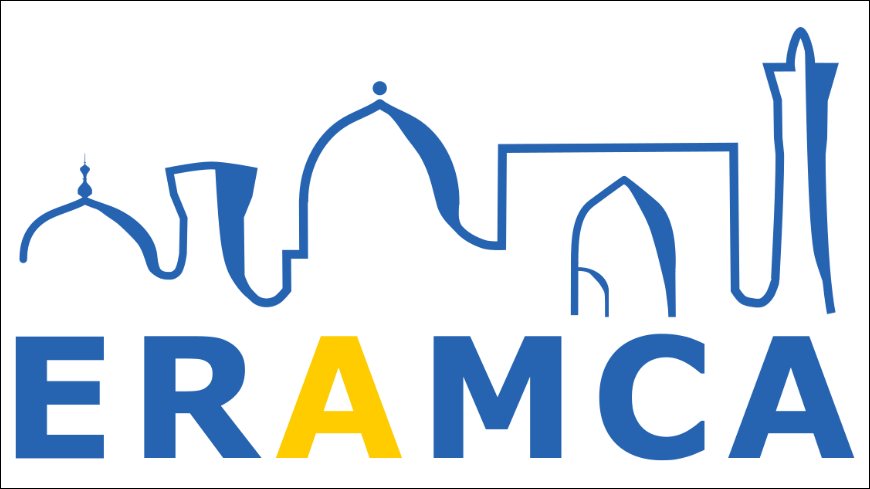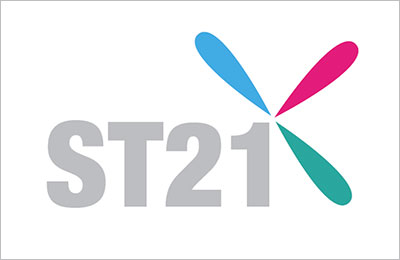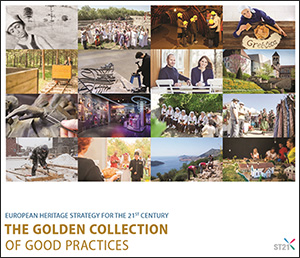Location of the initiative:

Initiator
Academic / scientific institution
Relation to Strategy 21 Recommendations:
K9 - Develop study and research programmes that reflect the needs of the heritage sector and share the findings
Time span of the initiative:
Start date: 15/01/2020 / End date: 14/01/2023 (foreseen)
Motivation / Methodology
ERAMCA project aims to mix European experience in Environmental CH risk assessment and reduction actions with the specific constraints for Central Asia region, to offer a possible and feasible interdisciplinary approach, which will grow up in joint actions at national level, thanks to the collaboration of local expert and young researchers that will continue to develop the strategy of ERAMCA project in the future years. ERAMCA will start by collecting detailed and specific information about the real situation of teaching activities and of the topics of interest for the local stakeholders by means of a Strategy Forum where all the possible interested public and private agencies will be invited to submit their expectations. UNESCO (Uzbekistan) and Ministry of Culture (Uzbekistan) (as Associate Partners) which operate with specific offices in Uzbekistan will play prominent role. The results of the Strategy Forum will be the basis to develop a Strategic Educational Agenda where all the needs in skill upgrade of local teachers will be underlined in order to allow them to become the future teachers of the ERAMCA Master. European and local teachers with the important contribution of the Associated Partners, will plan both the teacher’s training activities and the detailed contents of the Master to be developed. The teaching material that will be setup, will cover the interdisciplinary approach to complex problems of environmental risk assessment and mitigation on CH assets both from a theoretical and practical point of view. The practical contents will be represented by the solution of specific problems used as best practices and by the final projects that the students of the pilot course will develop during the internships that will be played by the students, assisted by the local teachers, inside public or private agencies. At national level the needs of governmental bodies will be satisfied by ensuring that if the involved HEIs will activate the ERAMCA Master, a new generation of technicians able to work in their own Countries to support and realize the national policies on CH assets Conservation strategies could be realized. Those new technicians could be absorbed inside public agencies responsible for CH conservation and valorisation and could collaborate, as external experts, inside specific projects. The interdisciplinary approach will establish new relationships between HEIs in the same Country by sharing their own experiences and by playing innovative roles in interdisciplinary actions. This fact will satisfy the need to increase the skill of local teachers and to drive them toward a more attractive interdisciplinary work and exchange of knowledge. As far as the needs of the Partner HEIs are concerned, ERAMCA will play an important role to the improvement of the staff of the universities (both teachers and technicians), to give to them the opportunity to build up a specialised Laboratory on the thematic of the project and to offer to the new generation of students the possibility to face “at home” the most up to date approach to the environmental risk assessment and reduction on CH assets by considering the real situation and constraints of their own Country. The ERAMCA objectives (understanding of local needs, design and implementation of a Master in Environmental risk assessment and mitigation for CH in Central Asia, design and implementation of a digital library with different kind of teaching materials, training of local teachers and technicians to an interdisciplinary approach in complex problem solving) are realistic and feasible due to:
- the real interest of the Partner Countries on these topics as demonstrated by recent legislations and official declarations;
- the tested interest of the Partner HEIs in developing new teaching activities, improving the local teacher’s skills and realizing new Laboratories able to support the teaching activities.
Obstacles / Barriers
The CH conservation strategies in Uzbekistan and Tajikistan need to be updated to the internationally accepted theories and best practices well developed especially in Europe as stated by all the governmental bodies in many occasions. This need and interest are demonstrated by the huge participation of Uzbekistan to the most important EU initiatives (e.g. INSPIRE) and by the presence in both of the involved Countries of a national UNESCO Office. The skills of the young local teachers both in Uzbekistan and Tajikistan needs to be expanded not only in specific disciplinary competences but also in the adoptions of new ways to develop their own teaching activity. The interdisciplinary approach and the bottom-up method that will be used to design the ERAMCA Master course will give to the local teachers the possibility to experiment the work methods today normally adopted by EU HEIs. The involvement inside all the WPs of EU and local teachers will guarantee the adaptations of the European experiences to the local socio-economic conditions and, therefore, the development of a new model for all the involved Countries. The co-founding of the Erasmus+ Programme will contribute to support the economic investment that local Universities and governmental bodies are trying to drive in the HEIs policies and development to overpass the post-Soviet crisis. The wide range of problems encountered by Uzbekistan and Tajikistan do not allow strong and specific actions in the field of CH conservation strategies ,therefore the Erasmus+ Programme could help to form a new generations of local teachers and technicians able to support from a theoretical and practical point of view the governmental policies in the field of environment actions on CH Conservation.
Uzbekistan owns more than 7.500 Cultural Heritage (CH) assets. Due to the impact of environmental and anthropogenic factors, 29 CH sites have been lost and 26 are in phase of destruction. In Uzbekistan, the threats of physical loss of CH sites are associated with a natural and anthropogenic wear processes caused by: adverse climatic conditions and structural instability of buildings; humidity and natural disasters; geological and hydrological motions and earthquakes; inappropriate intervention on buildings; fires, vandalism and other aggressive actions. One of the main lacks is the almost complete absence of a full documentation of each CH asset (both of international or national interests) and an appropriate monitoring of their real conditions. A second lack is the absence of technicians able to drive those processes and to suggest appropriate and economically sustainable risk reduction actions by following the most advanced suggestions coming from international recommendations. A third lack can be considered the absence of institutional curricula able to grow up a new generation of technician with the necessary knowledge. In the Republic of Tajikistan, a total of 2020 historical and cultural monuments are registered, including more than 300 architectural and more than 1000 archaeological. Some of them come to desolation from constant negative influence of natural and man-made hazards. Tajikistan’s territory is prone to the different types of natural disasters, as earthquakes, landslides, floods, debris flow, etc. and man-made hazards, as air pollution, fires, etc. The threats of physical loss (destruction) of CH sites are associated with a natural and man-made hazard and caused by adverse climatic conditions and structural instability of building; humidity and natural disasters; geological and hydrological motions and earthquakes; inappropriate intervention on buildings; fires, vandalism etc. The major lacks are absence of a proper documentation of the real conditions of cultural heritage sites (both international and national); practical absence of technical specialists at international level; lack of specific training programs in the country's Universities.
Change / Impact
ERAMCA is a joint effort between EU HEIs and Uzbekistan and Tajikistan HEIs, which aim is the introduction of the interdisciplinary approach into the teaching activities of local Universities with a voluntary acceptance of the EU policies and experiences in higher education systems. The today governments of both the Countries are facing the problem of CH conservation due to climatic changes, and natural disaster therefore the HEIs of the Partner Countries of ERAMCA are asked to develop international cooperation actions to improve the skills of local teachers and to plan curricula able to answer to the Country needs. ERAMCA is a cooperation project where EU teachers and local teachers of Uzbekistan and Tajikistan will work together to build up a new Master on Environment risk assessment and mitigation on CH assets in Central Asia by considering the problems encountered by those Countries in conservation policies of CH of national and international interest. The work method that will be adopted push the local teachers to work at interdisciplinary level to give a positive answer to specific complex problems of their own Countries. The strategy develops a preliminary audit of the stakeholders needs in terms of skill of the technician to be formed, develops a curricula by defining the disciplines and the courses to be activated, tests the proposal by means of a Pilot course, and, by analysing the results and the outcomes, makes the needed corrections by taking into consideration the comments of the stakeholders previously contacted. In this way, the HEIs of Uzbekistan and Tajikistan will experiment a new work method that could be applied for other specific tasks as suggested by local authorities when they asked to develop curricula that will ensure to the students real employment possibilities both in public and private agencies. ERAMCA will develop a digital open source library where all the teaching and practice materials will be uploaded. In this way all the HEIs of the Partner Country involved in the project could download the needed material to open new curricula and/or to integrate existing ones in the domain of interactions between Environment and CH Conservation strategies and actions. ERAMCA will also train local teacher to new teaching methodologies. At the end of the projects the local teachers could share the acquired competences to other colleagues of their own Countries to open to the other HEIs the work method and the specific acquired competencies. In Uzbekistan and Tajikistan both HEIs and Research Academies could provide courses at bachelor and master level: the presence inside the team of one Academy of Science represents a possible example to drive those two different kinds of institutes to start a new form of collaboration towards a common goal. The active presence inside the ERAMCA team of one Office of UNESCO will guarantee, for the main topic of the project, an international accepted approach to documentation, conservation, valorisation, and management of CH assets giving a real answer to the needs expressed in different occasions by different national bodies to adapt the CH conservation strategies to a more international level.
Lessons learned
ERAMCA is a Joint Project on Capacity Building between three Programme Countries (Italy, Germany, and Croatia) and two Partner Countries (Uzbekistan, and Tajikistan). ERAMCA will act by proposing a new curriculum on the specific topic on Environment risk assessment and mitigation on CH assets in Central Asia. The different interdisciplinary courses that will be planned and realized could be also used to integrate and upgrade existing curricula by all the interest HEIs of the Partner Countries. The work method adopted by ERAMCA (the strong involvement of labour market and national interests in the planning of higher education system) could represent a “best practice” for the development of similar projects and therefore could be considered as a contribution to the development of the governance, management and functioning of HEIs in the Partner Countries By considering the almost similar social and economic conditions and the HEI systems of the two Partner Countries, most of the following considerations could be considered valid for both of them. ERAMCA strategy and results will offer to the EHIs of the Partner Countries the possibility to increase the quality of their curricula by inserting interdisciplinary approach to a specific topic that is one of big interests in the involved Partner Countries. The full collaboration of all the partners into the development of the project starting from the need analysis up to the design of a Master course and the management of the Pilot Course will contribute to the cooperation between EU and Partner Countries. The planned actions and the interdisciplinary approach will drive also a mutual cooperation amongst the Partner Countries that will find inside the ERAMCA results possible way to manage common teaching activities and training upgrade of local teachers.
The Erasmus+ Programme founding is necessary by considering that Uzbekistan and Tajikistan HEIs will get closer contacts to research oriented institutions in EU, and they will have the chance to become partner in bilateral or multilateral research projects. Similarly, EU institutes will gain the chance to establish partnerships for future commons research applications for the further development of methods and technologies as well as use of new Laboratories for the preservation of CH assets. Especially the particular circumstances (e.g. climate, hazards, etc.) might allow research results which are relevant for other regions in EU as well. It is a common and added value for the proposal, that there is a common understanding to apply for research grants. By considering the economic and political situation of the two involved Partner Countries the today policies will not allow to expand in new directions the HEIs skills because they are still under the reinforcement and reconstruction of a basic teaching system.
Online resources
Contact information
Contact persons: Fulvio Rinaudo; Davorin Penava
Organisation: Politecnico di Torino
Emails: [email protected]; [email protected]
Phone: +39110907659
Website: https://www.eramca.com/
Source of financing
EU Grant





